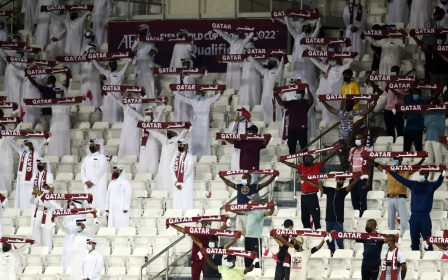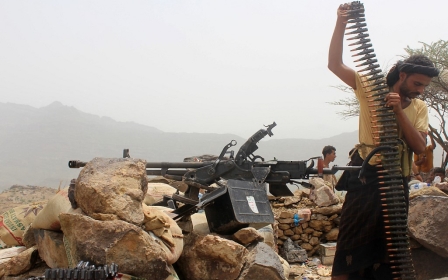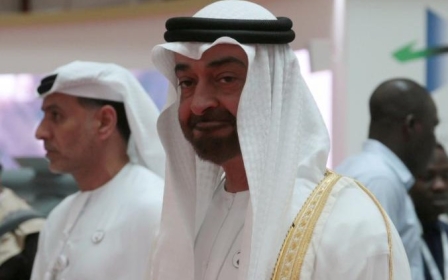Qatar accuses UK financier of hiding evidence in Banque Havilland case: Report
Qatari authorities have accused a British financier and his son of "brazenly" hiding crucial evidence in the latest Banque Havilland dispute over its alleged role in an economic attack on the Gulf state, Bloomberg News reported on Wednesday.
Lawyers representing Qatar said that David Rowland, who previously controlled the bank, and his son and firm director Edmund "intended to conceal emails" following accusations of the private bank's involvement in a financial attack against Qatar in 2017.
According to a call disclosed at a UK court hearing on Monday, the two reportedly talked about shifting future conversations off Banque Havilland's email system.
"We don't put anything down on the bank emails," Rowland said in one exchange, according to Qatar's lawyers.
"Nothing. No, I agree. We'll cut that out," Edmund replied, as reported by Bloomberg.
Qatar's lawyer David Mumford told the judge at a hearing where he was attempting to gain access to further bank documents that in another phone call Edmund told Rowland to "throw all your phones away".
Mumford did not say whether that ever happened.
Rowland, a donor to the UK Conservative party, bought the Luxembourg branch of the collapsed Icelandic bank Kaupthing in 2009, renaming it Banque Havilland.
Soon after, Abu Dhabi Crown Prince Mohammed bin Zayed (MBZ) became one of the bank's biggest clients, having $38m on account in 2012, according to court filings. Executives at the bank reportedly referred to MBZ as "the boss".
'Not part of any conspiracy'
In 2019, Qatar took Banque Havilland to court in London, accusing it of orchestrating a currency manipulation attack that cost the country more than $40 billion to shore up its banks and defend its currency peg against the US dollar.
Qatar used a presentation prepared by a Banque Havilland analyst as evidence and claimed the document detailed an attempt to deplete the country's reserves and damage its ability to host the 2022 World Cup.
In 2017, the bank reportedly created a presentation to help manipulate Qatar's currency and bond markets after Saudi Arabia and its allies - the United Arab Emirates, Egypt, and Bahrain - imposed a blockade on Doha.
The presentation is reported to have found its way to Yousef al-Otaiba, the UAE's ambassador to the US, who stored it on his computer under "Rowland Banque Havilland".
The plan, which was leaked to The Intercept in November 2017 after Otaiba's emails were hacked, recommended that the UAE "control the yield curve" to "decide the future".
Two finance experts told The Intercept that the leaked document's plan seemed to have been put together by someone with "little or no experience trading in credit and currency markets".
"I can't believe they put this on paper," one of the credit veterans said. "They are talking about colluding to manipulate markets."
Soon after the manipulation plan was sent to MBZ, the Qatari riyal - under pressure since the beginning of the Gulf Crisis in June 2017 - went into free fall and hit a record low.
The yield on Qatar's 10-year bonds also soared, as did the cost of insuring the country's debt against default. The currency did not recover until November of that year.
The bank defended itself by saying it was simply a "risk-management strategy" for UAE holdings of Qatar’s bonds, created in September 2017, months after Qatar's Central Bank claimed the manipulation happened.
"Banque Havilland firmly denies any allegations of wrongdoing or improper conduct made by the State of Qatar," a spokesman for the bank said in an emailed statement to Bloomberg.
"The bank was not part of any conspiracy against Qatar and rejects all of Qatar's claims."
Banque Havilland said Qatar disclosed the phone transcripts selectively and that the Rowlands had no intention of destroying or concealing evidence.
David Quest, a lawyer for the bank, said both David and Edmund Rowland were concerned that their phones and emails had been hacked. The Rowland's themselves aren't defendants in the case.
Banque Havilland did not respond to Middle East Eye's request for comment by the time of this article's publication.
Middle East Eye propose une couverture et une analyse indépendantes et incomparables du Moyen-Orient, de l’Afrique du Nord et d’autres régions du monde. Pour en savoir plus sur la reprise de ce contenu et les frais qui s’appliquent, veuillez remplir ce formulaire [en anglais]. Pour en savoir plus sur MEE, cliquez ici [en anglais].





